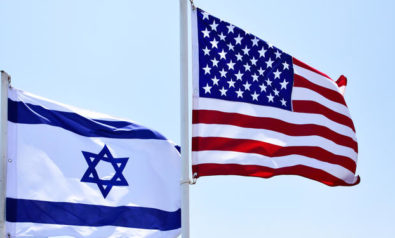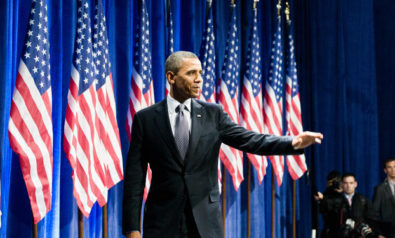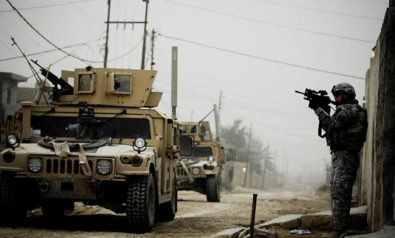Political upheaval in the Middle East and North Africa has forced the United States to re-evaluate its interests and foreign policy in the region.
Background
After World War I, access to natural resources became one of America’s top priorities, as oil was becoming increasingly important in modern industrial society. The United States pursued an "open door policy" to provide American oil companies with equal access to foreign oil, predominantly from the Gulf countries. Washington averted a collision with British oil interests in the Middle East by backing a stream of cooperative arrangements between the two countries from 1928-1934, which enabled the pair to dominate the world oil economy. America first gained access to Iraqi oil reserves, and later to Saudi Arabian resources during the 1930s.
In 1953, US involvement in the Middle East grew with the British-backed coup d'état of the democratically-elected Prime Minister of Iran, Mohammad Mosaddegh. Instrumental in provoking the coup was Mosaddegh's nationalisation of oil in1951, which took away control of Iran's oil from the British-owned Anglo-Iranian Oil Company.
Following the coup, the US-backed Iranian dictator, Mohammad-Reza Shah Pahlavi, proceeded to become increasingly authoritarian and dependent on American support to retain his power. The Shah was finally ousted in the 1979 Iranian Revolution.
With the Cold War in full swing, America perceived the rise of Pan-Arab nationalism with caution and as a direct threat. Egypt's Gamal Abdel-Nasser epitomised Pan-Arabism. At one stage, after initially approaching the US for military support, America’s refusal pushed Nasser closer to the Soviet Union for military backing, much to Washington's displeasure.
The US heightened distrust from the greater Muslim world by intervening in various regional conflicts from the 1970s into the 1990s, along with its strong backing of Israel. The western superpower responded to the Soviet invasion of Afghanistan by funding and arming the mujahedeen groups fighting the USSR, in a bid to combat the spread of communism. The move inadvertently aided the rise of Saudi-born Osama Bin Laden, and Al-Qaeda.
The US effort to gain a strategic ally in Saddam Hussein by arming and funding the Ba'athist regime during the Iran-Iraq war also backfired as the dictator proceeded to invade Kuwait in 1990, resulting in the Gulf War. Although the US successfully liberated Kuwait of Iraqi forces in the 1991, America's presence and influence in the Arab and Muslim world arguably led to the terrorist attacks on the World Trade Center in 1993, pre-empting the 9/11 attacks and America’s subsequent wars in Afghanistan and Iraq.
Why is the US and the Changing Middle East Relevant?
Like other leading world powers, including Russia, China and European nations, the US has had a long history of support for Middle Eastern and North African dictators. Significantly however, the Arab Uprisings have ousted many of America’s former allies — including Egypt's Hosni Mubarak — and has now called into question the influence that Washington may have in the region.
Despite being caught off guard by the Tunisian uprising and being highly hesitant with Egypt, the current US President Barack Obama has backed peaceful protests and reform in the Arab world. However, Washington has been highly cautious of the ongoing unrest in Bahrain, home to the US Fifth Fleet, due to geopolitical interests in countering Iranian influence amidst the ongoing nuclear dispute.
Moreover, the US holds strong support for other autocratic regimes like Saudi Arabia, despite its calls for Arab nations to enact reforms and meet protestor demands. Consequently, the US has often been criticised for its pursuit of geopolitical and strategic interests, like natural resources and the security of Israel, over supporting genuine reform throughout the entire Arab world.
In addition, the role of the US as a genuine broker in peace-talks between the Israelis and Palestinians has been questioned by analysts.
Significantly, the electing of Islamists in North Africa presents the US with a conundrum. While Washington has worked and cooperated with religiously conservative regimes like Saudi Arabia, the US has often sought to curb Islamist influence due to regional interests. The rise of Islamist parties like En-Nahda in Tunisia and the Muslim Brotherhood in Egypt has forced the US to rethink its stance.
Indeed, decades of sponsoring Arab dictators with questionable human rights records for the sake of sustaining military, security and oil agreements has left the US in a tight spot, as nations now seek to break with old norms and establish social, political and economic reform. As the presidential election draws near, the United States will have to re-evaluate its Middle East foreign policy in the years to come.
For more than 10 years, Fair Observer has been free, fair and independent. No billionaire owns us, no advertisers control us. We are a reader-supported nonprofit. Unlike many other publications, we keep our content free for readers regardless of where they live or whether they can afford to pay. We have no paywalls and no ads.
In the post-truth era of fake news, echo chambers and filter bubbles, we publish a plurality of perspectives from around the world. Anyone can publish with us, but everyone goes through a rigorous editorial process. So, you get fact-checked, well-reasoned content instead of noise.
We publish 2,500+ voices from 90+ countries. We also conduct education and training programs on subjects ranging from digital media and journalism to writing and critical thinking. This doesn’t come cheap. Servers, editors, trainers and web developers cost money.
Please consider supporting us on a regular basis as a recurring donor or a sustaining member.
Support Fair Observer
We rely on your support for our independence, diversity and quality.
Will you support FO’s journalism?
We rely on your support for our independence, diversity and quality.









